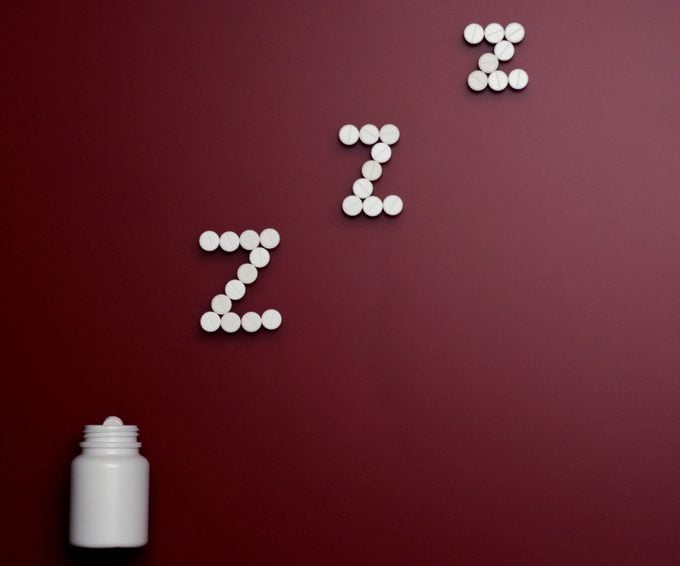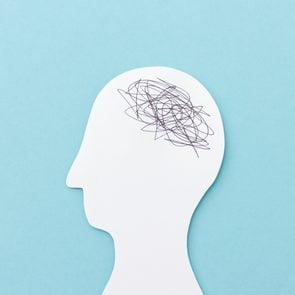Can You Use Melatonin for Anxiety? Here’s What You Need to Know
Updated: Oct. 25, 2022
Melatonin supplements can help with sleep problems, but will they relieve your anxiety? Here's what you should know if you're thinking of giving it a try, including possible risks and side-effects.
Melatonin has become a go-to supplement for helping Americans get a good night’s sleep. According to a 2020 survey from the Council for Responsible Nutrition (CRN), 66% of people who take a supplement for sleep health, take melatonin.
Get The Healthy @Reader’s Digest newsletter
Taking the synthetic version of the hormone can signal to your body that it’s time for bed if it’s not naturally winding down on its own.
“Melatonin is a hormone that’s produced in the brain by the pineal gland,” says Melinda Ring, MD, executive director of the Osher Center for Integrative Medicine at Northwestern University in Chicago. “It’s responsible for many different things, most notably for regulating our body’s circadian rhythm.”
Eric Rafla-Yuan, MD, a clinical professor in the department of psychiatry at the University of California San Diego, explains that our brains produce melatonin in response to a lack of light.
“Our brain’s default is to make melatonin,” he says. “But when it’s light out, receptors in our eyes that detect light tell our brains not to make it.”
People sometimes take melatonin for other conditions as well. According to the CRN survey, 37% of supplement users who take supplements for mental health reasons—like anxiety, depression and stress management—take melatonin. But is this relaxation helper also a magic-bullet for anxiety?
10 Trusted Home Remedies for Natural Anxiety Relief
What the research says about melatonin for anxiety
Taking melatonin for sleep—in particular, delayed sleep-phase syndrome, where you have trouble falling asleep—is well-documented. However, evidence that it can help for anxiety is limited.
“There have not been any studies that show that taking melatonin every day is an effective treatment for generalized anxiety, social anxiety, things like that,” says Dr. Rafla-Yuan.
That said, there is some research that suggests there are benefits in specific circumstances. For example, a 2015 study published in Cochrane Systematic Review-Intervention that looked at 12 randomized controlled trials found that, when compared to a placebo, melatonin could reduce anxiety before a medical procedure, such as a hysterectomy or cataract surgery.
“Melatonin gets the brain ready for sleep, and this is possibly what helps with the anxiety. It triggers our brain that it’s time for relaxation and winding down,” says Dr. Rafla-Yuan, who works with patients to help them manage their anxiety with medical and dental procedures.
How to Relax: 10 Proven Strategies to Soothe You Right This Minute, from Psychology Experts

Melatonin may be helpful for sleep-relaxed anxiety
Even though the evidence specifically linking melatonin to anxiety is weak, it could still be a helpful tool, especially if your anxiety is sleep-related.
“When we think about insomnia, a lot of insomnia can be related to anxiety with racing minds and that kind of thing.” says Dr. Ring. On the flip side, if you don’t get enough sleep, you have the potential to be more anxious the next day.
“We do know that it tends to be a cycle. People with insomnia, especially chronic insomnia, tend to have worse depression and worse anxiety. And we also know that people with depression and anxiety tend to have worse sleep,” says Dr. Rafla-Yuan.
Alex Dimitriu, MD, double board-certified in psychiatry and sleep medicine and founder of Menlo Park Psychiatry & Sleep Medicine, adds that melatonin has been shown to improve sleep quality, which may also help the brain better restore itself at night and be better equipped to handle daily stress and dips in mood.
Here’s How to Fall Back Asleep After Waking Up in the Middle of the Night
Should you consider melatonin for anxiety?
If you have generalized anxiety, melatonin is not considered a go-to treatment. “It’s actually not something that would be a first-line recommendation from me, in terms of anxiety, unless it’s sleep-related anxiety issues,” says Dr. Ring, adding that other supplements, like lemon balm, lavender, or chamomile, could be more beneficial.
Dr. Ring recommends always talking to a health-care provider before trying any new supplements.
When you should avoid melatonin
Dr. Ring cautions you shouldn’t take melatonin alongside other sedatives without doctor supervision and that if you have a history of seizures you should also work with a doctor to see if melatonin is appropriate for you. Melatonin can also interact with other medications like blood thinners.
Dr. Rafla-Yuan notes that melatonin has not been as well-studied in infants and children, and so people in those age groups should not take it without a doctor’s support.
People who are pregnant or breastfeeding should also avoid melatonin, adds Dr. Ring.
Side effects of melatonin
If sleep issues are contributing to your anxiety and you want to try melatonin, there’s likely no harm, says Dr. Rafla-Yuan.
“Melatonin has really low side effects, especially when compared to other sleeping medications. So it is always a medication I recommend folks try if they think they would be helped by sleep medication.”
General side effects of melatonin include headache or dizziness, nausea, drowsiness, depression or exacerbation of depression. “In fact, some people even have anxiety or irritability,” says Dr. Ring. “All of those are a possibility, but generally it’s well tolerated.”
21 Depression Memes that May Make You Feel a Little Better
If you want to try melatonin for anxiety
Melatonin is most commonly purchased over-the-counter in pill, gummy or liquid form. A range of doses are available—from 0.3 mg to 10 mg and higher—but larger doses aren’t necessarily more effective.
If you’re generally healthy and not taking other medications, Dr. Ring says it would likely be safe to try melatonin without talking to a doctor first. It’s important to note though, that the timing and dose can influence its effectiveness, so you may want to work with a doctor regardless.
Dr. Ring suggests sticking with well-known, good quality brands, ideally those that have been tested by a consumer lab or have the USP (U.S. Pharmacopeial Convention) verified mark, which indicates the supplements have been vetted for their potency, purity and overall quality.
The Best Time of Day to Take 11 Common Supplements
Because melatonin is sold as a dietary supplement, it’s not as stringently regulated as a drug would be, which means there could be concerns about contaminants, or the product containing less, or more, melatonin than is specified on the label, explains Dr. Ring.
Remember though, melatonin on its own is not considered a treatment for anxiety and should only be used in conjunction with a number of different measures. “It would fall under lifestyle modifications,” says Dr. Rafla-Yuan. “We know that sleep, diet, and exercise are all important parts of a comprehensive anxiety treatment plan. There are other medications for anxiety specifically that we would also consider. And then psychotherapy can also be an important part of the treatment plan as well.”
For more wellness updates, follow The Healthy on Facebook, Instagram, and Twitter. Keep reading:
- 5 Science-Backed Reasons Volunteering Is Actually a Powerful Way to Feel Healthier
- Eating This Nut Will Help Your Gut and Reduce Inflammation, New Study Says
- Duchess Meghan Markle’s 11 Quiet Habits That Help Her “Survive and Thrive” in Royal Life
- What Do Nutritionists Eat? We Toured Inside a Dietitian’s Fridge and Found These 15 Groceries



